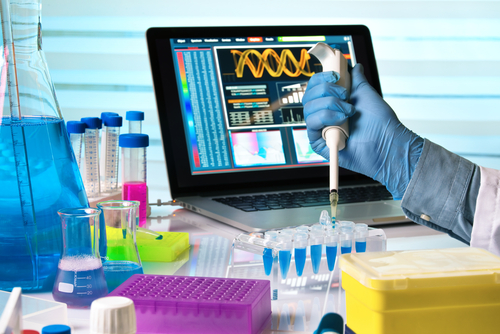Pfizer Launches Phase 1b Clinical Trial for Mini-Dystrophin Gene Therapy to Treat DMD

Pfizer, Inc began a Phase 1b clinical trial (NCT03362502) for its investigational mini-dystrophin gene therapy product, PF-06939926, in patients with Duchenne muscular dystrophy (DMD).
The first dose of the mini-dystrophin gene ( a shortened version of the human dystrophin gene) was given by intravenous infusion to a boy with DMD on March 22, under the supervision of principal investigator, Edward Smith, MD, associate professor of pediatrics and neurology at Duke University Medical Center, in collaboration with Cure Duchenne organization.
DMD is a genetic disease caused by the absence of dystrophin, a protein essential for muscular function. Without dystrophin, muscle cells start deteriorating, leading to progressive muscle degeneration and weakness. The disease primarily affects boys.
Pfizer’s PF-06939926 is an investigational gene therapy that uses a carrier, the adeno-associated virus serotype 9 (AAV9) capsid, to transport the mini-dystrophin gene. The AAV9 capsid was used as the carrier because of its potential to specifically target the muscles.
“On the behalf of the community of individuals and families living with Duchenne muscular dystrophy, we applaud the important step Pfizer has taken to advance a potentially transformational treatment option for boys stricken with this terrible disease,” said Debra Miller, chief executive officer and founder of Cure Duchenne, in a press release. “The momentum we are seeing in the field of gene therapy emphasizes the maturing opportunity to advance the science.
The Muscular Atrophy News forums are a place to connect with other patients, share tips and talk about the latest research. Check them out today!
“Today, there are very limited treatment options for our boys. Through collaboration and ongoing dialogue with companies like Pfizer, we hope to succeed in finding therapies that could dramatically change the outcomes for those with DMD,” Miller said.
PF-06939926 was granted Orphan Drug and Pediatric Rare Disease Designations by the Food and Drug Administration and Orphan Medical Product Designation by the European Medicines Agency in May 2017.
The ascending dose Phase 1b clinical study of a single intravenous infusion of PF-06939926 will involve about 12 ambulatory boys with DMD age five to 12. The study will measure the following outcomes: safety; tolerability; dystrophin expression and distribution; and muscle function, quality, and strength. As controls, some candidates will be tested to confirm a negative result for antibodies against the AAV9 capsid and for a T-cell (immune) response to dystrophin.
Five clinical research sites at Duke University in Durham, North Carolina, are currently recruiting participants. Five more sites in Salt Lake City, Utah, have not yet begun recruiting. Visit the trial’s Contacts and Locations section for more information.
First results of the trial are expected in the first half of 2019, once all patients have been evaluated for one year, post-treatment.
“Investment in this trial represents the culmination of years of research on behalf of patients by scientists at Pfizer and academic medical centers, along with the support of the DMD patient advocacy community, in the important quest to advance a program that could potentially change the trajectory of this debilitating disease,” said Greg LaRosa, PhD, senior vice president and chief scientific officer of Pfizer’s Rare Disease Research Unit.
“We’ve listened to the patient community and we know there is a dire need for treatment options; with this in mind, we have built on important scientific advances to design a therapy with the potential to deliver the mini-dystrophin gene to the body and address the underlying cause of DMD, regardless of mutation. This trial will assess the safety of this approach to gene therapy and could provide valuable data demonstrating its potential impact to slow down or stop the progression of DMD.”
The clinical trial is the first recombinant AAV-based gene therapy study performed by Pfizer. Recently, the company made a $100 million investment on a gene therapy commercial-scale manufacturing facility in Sanford, North Carolina.
Pfizer also coordinates another ongoing clinical program targeting DMD. It involves domagrozumab, an investigational, infused, anti-myostatin antibody currently in a Phase 2 trial (NCT02310763).






